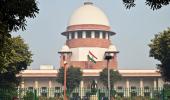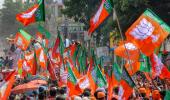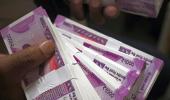A Supreme Court Constitution Bench -- Chief Justice Dr Dhananjay Yeshwant Chandrachud, Justices Sanjiv Khanna, B R Gavai, J B Pardiwala and Manoj Misra -- will begin hearing the Electoral Bonds case from October 31.

The 10-day window for the sale of the 28th tranche of electoral bonds, which opened on October 4 and closed on Saturday (October 14), coincided with the Election Commission of India announcing the assembly poll schedule for Mizoram, Chhattisgarh, Madhya Pradesh, Rajasthan, and Telangana on October 9.
According to data available for the 26 tranches sold between March 2018 and April 2023, 22,458 bonds worth Rs 12,955.26 crore/Rs 129.5526 billion were redeemed during these five years, with nearly a third, or 34.23 per cent, of the total value of these bonds redeemed by political parties in three months alone -- March, April, and May 2019 -- that is, tranches eight to 10, the period of the 2019 Lok Sabha elections.
On October 10, the Supreme Court said it would hear a slew of petitions challenging the electoral bond scheme, including one by the Association for Democratic Reforms (ADR), bringing the focus back to the controversial election funding instrument ostensibly introduced to reduce the role of unaccounted money in elections.
The petitioners have asked the Supreme Court to decide upon the scheme's legality before the 2024 Lok Sabha elections.
The court will adjudicate on two issues: The legality of anonymous donations to political parties and the violation of citizens' right to information about the funding of political parties.
According to an ADR analysis, 94.19 per cent, or Rs 12,226 crore/Rs 122.26 billion, of the total value of bonds purchased until April 2023 were in the denomination of Rs 1 crore/Rs 10 million, which 'indicates that corporates rather than individuals are purchasing these bonds'.
Electoral bonds, or bearer instruments like promissory notes, can be bought by citizens or entities to donate funds to political parties and issued in multiples of Rs 1,000, Rs 10,000, Rs 1 lakh, Rs 10 lakh, and Rs 1 crore at select State Bank of India branches.
ADR found that 14,260 bonds worth Rs 8,362.83 crore/Rs 83.6283 billion, or 64.55 per cent of the total electoral bonds redeemed between March 2018 and April 2023, were encashed in New Delhi, where the headquarters of most of the national parties, including the two most prominent, the Bharatiya Janata Party and Congress, are located.
Apart from Delhi, bonds worth Rs 1,602 crore/Rs 16.02 billion were encashed in Hyderabad, Rs 1,297.44 crore/Rs 12.9744 billion in Kolkata, Rs 771.5 crore/Rs 7.715 billion in Bhubaneswar, Rs 662.5 crore/Rs 6.625 billion in Chennai, and Rs 258.74 crore/Rs 2.5874 billion in other cities.
The BJP and Congress are the top two beneficiaries of the electoral bonds, followed by the Trinamool Congress.
According to the ADR analysis, based on the annual audit reports political parties have filed with the Election Commission of India between 2017-2018 and 2021-2022, the BJP received Rs 5,271.97 crore/Rs 52.7197 billion in funds through electoral bonds of a total of Rs 9,190.86 crore/Rs 91.9086 billion, which is 57 per cent of all electoral bonds redeemed by political parties during the period.
Of the BJP's share, Rs 2,555 crore/Rs 25.55 billion, or almost half, came in 2019-2020, the year of the Lok Sabha polls; Rs 1,450.89 crore/Rs 14.5089 billion in 2018-19; and Rs 1,033.7/Rs 10.337 billion in 2021-2022, which saw key assembly elections, including in Uttar Pradesh in February-March 2022.
The Congress received Rs 952.29 crore/Rs 9.5229 billion, or 10.36 per cent of the total, and the TMC got Rs 767.88 crore/Rs 7.6788 billion (8.35 per cent).

Other leading beneficiaries included the Biju Janata Dal (BJD), which received Rs 622 crore/Rs 6.22 billion (6.76 per cent).
The Dravida Munnetra Kazhagam got Rs 431.5 crore/Rs 4.315 billion (4.69 per cent), and Bharat Rashtra Samithi (BRS) received Rs 383.65 crore/Rs 3.8365 billion (4.17 per cent).
The Yuvajana Sramika Rythu Congress Party (YSRCP) received Rs 330.44 crore/Rs 3.3044 billion, and Shiv Sena got Rs 101.38 crore/Rs 1.0138 billion.
Of the TMC's funds from electoral bonds, Rs 528.14 crore/Rs 5.2814 billion, or 68.77 per cent of the Rs 767.88 crore/Rs 7.6788 billion it received in the period, came in 2021-2022.
The elections to the West Bengal assembly took place in April 2021.
The pattern is similar for the rest of the parties mentioned above.
These parties received the lion's share of their funds through electoral bonds in the financial year when the states they are influential in went to polls.
Since the scheme's introduction, most voluntary contributions to national parties -- above Rs 20,000 -- were via electoral bonds.
From 2017-2018 to 2021-2022, the BJP received 52 per cent of all its donations in electoral bonds, while the Congress received 61.54 per cent of all its donations in electoral bonds, the TMC 93.27 per cent, BJD 89.81 per cent, DMK 90.7 per cent, BRS 80.45 per cent, and YSRCP 72.43 per cent.
Common Cause and ADR, both non-governmental organisations, and the Communist Party of India-Marxist, have challenged the scheme's validity.
They have flagged that the Centre has removed the limit on the amount companies could donate to political parties -- 7.5 per cent of their average net profits in the previous three years -- through amendments to the Companies Act, 2013, paving the way for unlimited funding from firms.
ADR has demanded either the scheme should be scrapped or the principle of anonymity of the bond donor must be done away with.
It has asked the Supreme Court to order all political parties that receive donations through electoral bonds to declare in their contribution reports the total amount of such donations received along with the detailed particulars of the donors for each bond.
It has also demanded that the scheme come under the purview of the Right To Information Act.
Feature Presentation: Aslam Hunani/Rediff.com











